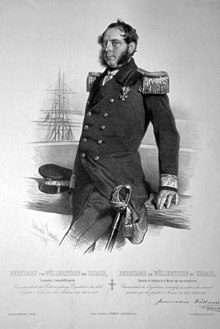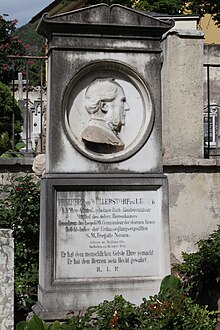Bernhard von Wüllerstorf-Urbair
Bernhard Freiherr von Wüllerstorf-Urbair (also: von Wüllersdorf-Urbair or von Wüllerstorf and Urbair ; born January 29, 1816 in Trieste , Austrian coastal region , today Italy ; † August 10, 1883 in Gries near Bozen , South Tyrol ) was an Austrian vice admiral , from 1865 to 1867 kk trade minister. He also led the circumnavigation of the frigate Novara ( Novara Expedition ) (1857-1859).

origin
His parents were the Gubernialsekretär Karl Leopold von Wüllerstorf-Urbair († December 31, 1817 in a hunting accident) and his wife Julie , born Countess Grochowska (born September 16, 1795). His mother married on May 15, 1820 as a widow, the later Vice President of the government in Venice, Count Johann Baptist Marzani (born October 30, 1794, † October 13, 1865). His stepfather awakened his interest in economics. He also had a sister Rosalie (* 1815), who married Baron Ernst von Bonar in 1834, Majorate Lord of Fingreth and Rinneardington.
Life

After attending grammar school in Padua and in Ofen , he entered the pioneer cadet school in Tulln in 1828 . As a cadet of the 40th Infantry Regiment, he was transferred to the Navy in 1833 at the request of the Court War Council . Immediately ordered to a ship, he had to acquire his further training largely through self-study. Promoted to ensign of the line in 1839, he seized the opportunity to be assigned to the observatory in Vienna, where he was instructed by well-known astronomers such as Littrow and Schaub. After completing these studies, he was entrusted with the management of the naval observatory in Venice and teaching astronomy and nautical science at the local naval academy. Due to his elegant demeanor and his winning manner, he quickly made contact with the Venetian society. Soon after his marriage to Anna O'Connor of Connaught (1824-1848) on April 12, 1847, the revolution broke out in Venice . He left the city with his young wife, who died in the course of the escape. He reported immediately to Trieste, where Lieutenant Field Marshal Gyulay had collected the remains of the Navy that had remained loyal to him.
Wüllerstorf-Urbair became an important employee of Vice Admiral Hans Birch Dahlerup, who was entrusted with the reorganization . So he replaced Italian with German as the command language and introduced a new signaling system. In 1849 he was promoted to corvette captain. The next few years passed, alternating between staff work and ship command. In 1855 he became an advisor to the new naval commander Archduke Ferdinand Max . From 1854 he was the captain of the ships of the line and in command of the frigate Venus . Soon afterwards he was able to win over his progress-loving master to plan a circumnavigation, which he was entrusted with planning in 1856. As a commodore of the frigate Novara, he personally commanded the expedition, which lasted from April 30, 1857 to August 26, 1859. Numerous research results, rich collections for emerging Viennese museums and high reputation for the imperial navy were the most important results of this circumnavigation (the second under the Austrian flag). Due to his scientific knowledge, he was able to make all oceanographic, hydrographic and meteorological observations himself. For his scientific achievements he was elected a member of the German Academy of Sciences Leopoldina in 1860 and in 1863 as an honorary member of the Kgl. Bavarian Academy of Sciences added. Karl von Scherzer's three-volume report on it, “Journey of the Austrian frigate Novara around the earth in the years 1857, 1858, 1859 under the orders of Commodore B. von Wüllersdorf-Urbair”, was published in 1861, immediately translated into English and Italian and was a bestseller, right after v. Humboldt's Kosmos: The 5,000 copies of the cheaper two-volume popular edition were sold out within a year.
After a deployment in the waters around Sicily , threatened by Garibaldi's troops , he became admiral and representative of the naval commander at the Imperial Council in Vienna. Also in 1861 he was appointed port and fortress commander in Pola . In 1864, during the German-Danish War, he led an squad into the North Sea , where Wilhelm von Tegetthoff had fought the naval battle of Heligoland even before his arrival . This exposed him to barely justified criticism.
In the fall of 1865 he was asked by Prime Minister Belcredi to take over the Ministry of Commerce. As a minister in a politically controversial government (in the contemporary press also referred to as the "Dreigrafenministerium", since besides Prime Minister Count Belcredi, Count Larisch-Mönich and Mensdorff-Pouilly belonged to him) he endeavored to conclude trade agreements and dealt with the Communications and postal services and designed a program to complete the railway network, which was largely implemented. He also initiated the introduction of metric weights and measures in Austria. Under his leadership the expansion of the port of Trieste was started . The compromise with Hungary in 1867 caused him to resign. He died in Gries near Bozen and was buried in the local cemetery .
Awards and honors
After his return from his two-year trip around the world, Wüllerstorf was personally received by Emperor Franz Joseph I in Vienna and on this occasion was awarded the Order of the Iron Crown, 2nd class , and at the same time raised to the status of hereditary Austrian baron. After his resignation from the office of Minister of Commerce, he received the Grand Cross of the Order of Leopold and was appointed a lifelong member of the Austrian manor house.
family
He married on April 12, 1847 Anna O'Conor of Connaught (born February 3, 1824, † July 29, 1848), a born Englishwoman whose family is based in Venice. The couple had a son Karl Patrik Leopold (* July 17, 1848 - † January 3, 1906), who became captain of the liner and married Maria Josepha Pincini in 1878 (* September 1, 1857 - June 5, 1926).
He married Countess Leopoldine von Rothkirch und Panthen on August 3, 1861 in Graz (* July 31, 1820).
Fonts (excerpt)
- Bernhard von Wüllerstorf-Urbair, Robert Müller: Observations of the Comet Donati on board the kk Austrian frigate "Novara", by Commodore Bernhard v. Wüllerstorf and the frigate lieutenant Robert Müller , in: Astronomische Nachrichten , Volume 50, 1859, p. 211.
- Bernhard von Wüllerstorf-Urbair: A railway network for the Austrian monarchy , in: Österreichische Revue , 1866, p. 22 ff.
literature
- E. Oberegger: Wüllerstorf-Urbair and the railway. His memorandum from 1866 , in: Publications of the Info Office for Austrian Railway History , 2, Sattledt 2008.
- Oscar Criste: Wüllerstorff-Urbair, Bernhard Freiherr von . In: Allgemeine Deutsche Biographie (ADB). Volume 44, Duncker & Humblot, Leipzig 1898, p. 308 f.
- Constantin von Wurzbach : Wüllerstorf-Urbair, Bernhard Freiherr . In: Biographisches Lexikon des Kaiserthums Oesterreich . 58th part. Kaiserlich-Königliche Hof- und Staatsdruckerei, Vienna 1889, pp. 214–222 ( digitized version ).
- Friedrich Wallisch : His ship was called Novara. Bernhard von Wüllerstorf - Admiral and Minister , Vienna 1966.
- Helmut Neuhold: Austria's heroes at sea . Styria Verlag Wien-Graz-Klagenfurt 2010, pp. 92-105, ISBN 978-3-222-13306-0 .
- Gothaisches genealogical pocket book of baronial houses, 1866, p.1057
Web links
- Entry on Bernhard von Wüllerstorf-Urbair in the Austria Forum (in the AEIOU Austria Lexicon )
Individual evidence
- ^ Biographical Lexicon of the Austrian Empire, 58th Theil, Vienna 1889, p. 214.
- ^ Biographical Lexicon of the Austrian Empire, 58th Theil, Vienna 1889, p. 214.
- ^ Member entry by Bernhard Frhr. von Wüllerstorf-Urbair (with picture) at the German Academy of Natural Scientists Leopoldina , accessed on November 13, 2015.
- ^ Biographical Lexicon of the Austrian Empire, 58th Theil, Vienna 1889, p. 216.
- ↑ s. Memorandum 1866, “A railway network for the Austrian monarchy”.
- ^ Biographical Lexicon of the Austrian Empire, 58th Theil, Vienna 1889, p. 217.
- ^ Biographical Lexicon of the Austrian Empire, 58th Theil, Vienna 1889, p. 216.
- ^ Biographical Lexicon of the Austrian Empire, 58th Theil, Vienna 1889, p. 217.
| personal data | |
|---|---|
| SURNAME | Wüllerstorf-Urbair, Bernhard von |
| ALTERNATIVE NAMES | Wüllersdorf-Urbair, Bernhard Freiherr von |
| BRIEF DESCRIPTION | Austrian admiral |
| DATE OF BIRTH | January 29, 1816 |
| PLACE OF BIRTH | Trieste |
| DATE OF DEATH | August 10, 1883 |
| Place of death | Gries near Bozen , South Tyrol |

